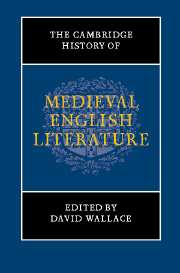Book contents
- Frontmatter
- I AFTER THE NORMAN CONQUEST
- II WRITING IN THE BRITISH ISLES
- Introduction
- 7 Writing in Wales
- 8 Writing in Ireland
- 9 Writing in Scotland, 1058–1560
- 10 Writing history in England
- 11 London texts and literate practice
- III INSTITUTIONAL PRODUCTION
- IV AFTER THE BLACK DEATH
- V BEFORE THE REFORMATION
- Chronological outline of historical events and texts in Britain, 1050–1550
- Bibliography
- Index of manuscripts
- Index
- References
11 - London texts and literate practice
from II - WRITING IN THE BRITISH ISLES
Published online by Cambridge University Press: 28 March 2008
- Frontmatter
- I AFTER THE NORMAN CONQUEST
- II WRITING IN THE BRITISH ISLES
- Introduction
- 7 Writing in Wales
- 8 Writing in Ireland
- 9 Writing in Scotland, 1058–1560
- 10 Writing history in England
- 11 London texts and literate practice
- III INSTITUTIONAL PRODUCTION
- IV AFTER THE BLACK DEATH
- V BEFORE THE REFORMATION
- Chronological outline of historical events and texts in Britain, 1050–1550
- Bibliography
- Index of manuscripts
- Index
- References
Summary
When literary scholars of the 1980s revived interest in London as the home of a ‘social’ Chaucer, they recognized that the city could no longer be treated as a self-contained cultural entity. Not only was the city linked to the court because Chaucer’s circle bridged both places, but a fresh awareness of the events of 1381 revealed the city to be open to influences from the countryside as well. A city with such permeable boundaries could no longer be defined in terms of a culturally distinct ‘merchant class’. It was plausibly argued that ‘English mercantile culture was largely confected out of the materials of other cultural formations – primarily aristocratic but also clerical – and lacked a centre of its own’. For critics preoccupied with Chaucer, London had become an ‘absence’, a place without a defining centre that could be imagined only as a ‘discourse of fragments, discontinuities, and contradictions’ and not as a ‘single, unified site’.
In emphasizing the fluidity and derivative quality of urban culture, such formulations have much to contribute to a literary history of London. They liberate the city from its traditional identification with a ‘merchant mentalité’ and re-create it as a fascinating convergence of cultural influences and institutional discourses. This has proved to be a particularly fruitful approach in studies of Chaucer, where it has helped to explain the generic diversity and polyvocality of the Canterbury Tales. For a literary study of London that goes beyond Chaucer, however, it would also seem desirable to rematerialize the city somewhat, not to redraw the old boundaries but to recover more of the specific historical conditions – including the conditions of textual production and reception – that Chaucer’s poetry is so notoriously concerned to suppress.
- Type
- Chapter
- Information
- The Cambridge History of Medieval English Literature , pp. 284 - 310Publisher: Cambridge University PressPrint publication year: 1999
References
- 12
- Cited by



